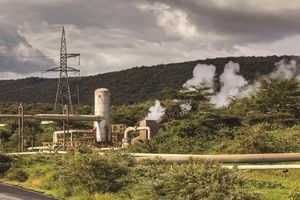
The cost of power in Kenya has been made expensive because the power provider buys power expensively from 19 IPPs when the same can be procured at a cheaper rate from KenGen.
The National Assembly and the Senate are headed on a collision course over when and whether the overpriced Power Purchase Agreements (PPAs) by the Independent Power Producers (IPPs) supplying electricity in the country should be renewed or new deals signed.
The Senate, through a motion before the House, wants the government to enter into new power deals or renew existing ones.
But the National Assembly wants any PPAs with IPPs delayed until an inquiry by its Energy Committee has been concluded and adopted at the plenary.
The Senate motion sponsored by its Energy Committee chairperson Wamatinga Wahome (Nyeri) is premised on the fact that the timeline of a moratorium imposed by the National Assembly on the State-owned Kenya Power and Lighting Company (KPLC) against entering into new deals with IPPs or renewing the existing ones, has expired.
“In order to cushion Kenyans from the high cost of electricity, the Senate resolves that the Ministry of Energy and Petroleum and Kenya Power be allowed to enter into new power purchase agreements or renew existing power purchase agreements with the Independent Power Producers,” the motion reads.
The motion is already slated for debate on October 1, 2024 just days after Energy Cabinet Secretary Opiyo Wandayi revealed the possibility of signing new power deals to allow new IPPs generate more power to the national grid and increase capacity.
“We will definitely be imploring on parliament to lift the moratorium to allow IPPs generate more power to enhance the country’s national grid,” said Mr Wandayi.
Since he was sworn-in as Energy Cabinet Secretary on August 8, 2024, the country has suffered two blackouts blamed for tripping on its high-voltage transmission lines.
“What we are witnessing today has built up over time and is as a result of sub-optimal investment in infrastructure,” said Mr Wandayi of the outage which affected large parts of the country and coming just days after the August 30, 2024 blackout.
In the last two years, the country’s premier airport- Jomo Kenyatta International Airport (JKIA) has been plunged into total darkness over a series of power outages.
The Senate motion also wants the Energy and Petroleum Regulatory Authority (EPRA) to fast track the acquisition of necessary licenses required by the IPPs with valid power purchase agreements for setting up power plants.
Growing demand
KPLC, Kenya’s leading electricity utility, providing power to over 9.6 customers across the country, imports 17 percent of its electricity from neighboring countries and faces a challenge as the growing demand for electricity is conflicted with the lengthy process of developing power plants.
The development of power plants usually takes 6 to10 years from conception to generation, leading to electricity shortage and load shedding which impedes economic growth.
The cost of power in Kenya has been made expensive because the power provider buys power expensively from 19 IPPs it has engaged when the same can be procured at a cheaper rate from Kenya Electricity Generating Company (KenGen), another state agency.
What the Ministry of Energy has been pondering is the introduction of control measures and public participation over how IPPs are brought on board.
On March 29, 2021, immediate former President Uhuru Kenyatta set up a task force to review power purchase agreements between the government and IPPs.
The setup of the task force saw a moratorium imposed on Kenya Power, preventing it from signing new agreements or renewing existing ones with the IPPs but was lifted by the Cabinet in March 2023.
However, months later, the National Assembly through a motion adopted on April 19, 2023, placed a moratorium, restricting Kenya Power from signing and renewing power purchase agreements (PPAs) with the IPPs pending a report of inquiry by its Committee on Energy and the consequent House resolution on the report.
The war between the two Houses over whether to sign or not to sign new PPAs or renew the existing ones with the IPPs manifested on February 28, 2024 when the Senate passed a motion by its Energy Committee on inquiry into the high cost of electricity in the country.
While setting the groundwork for the inquiry into expensive electricity in the country, the Senate made its position clear.
“The Ministry of Energy to, among others, create a one-stop IPP office that comprises all the stakeholders required for approval of power plants and that the Ministry, through KPLC and IPPs renegotiate the current power purchase agreements within 12 months of adoption of the report,” the Senate motion reads.
The National Assembly has previously raised questions on the huge difference between the rates Kenya Power procures electric power from KeGen and the 19 IPPs.
The current PPA framework is such that Kenya Power pays Kengen and IPPs for energy delivered, fuel used in the generation and capacity charges for each power purchase agreement.
For instance, a document presented to the National Assembly by former Energy Cabinet Secretary Charles Keter shows that during the 2019/20 financial year, Kenya Power paid the IPPs Sh50.22 billion for the Sh2.9 billion of energy supplied in Kwh.
Interestingly, the 8.24 billion Kwh power procured directly from Kengen cost Kenya Power Sh40.92 billion, meaning that energy bought directly from KenGen is cheaper than that from IPPs.
A simple calculation shows that it costs Kenya Power Sh4.90 a Kwh for the power bought from KenGen compared to the Sh17.30 it spent per Kwh for the energy supplied by the private power producers.
The document the former Energy CS presented to the National Assembly listed the 19 operational IPPs doing business with the government.
They included Iberafrica-plant 2, Mumias Sugar Company, Orpower4- plant I, Orpower4- plant II, Orpower4- plant III, Tsavo power, Rabai power, Imenti Tea-Hydro and Thika power.
The others are Gikira hydro power, Gulf power, Triumph power, Orpower4- plant IV, Biojoule, Regen Terem, Chania- KTDA, Gura- KTDA, Strathmore solar and Lake Turkana Wind power.
CS Keter did not however provide the ownership details of the IPPs noting that they are contractual and will require legal clearance before they are availed.











